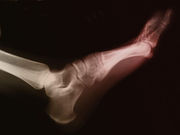Reducing glycemic index lowers uric acid levels, regardless of percentage of carbohydrates in diet
THURSDAY, June 2, 2016 (HealthDay News) — Reducing the dietary glycemic index is associated with a reduction in uric acid levels among overweight and obese adults, according to a study published in the May issue of Arthritis & Rheumatology.
Stephen P. Juraschek, M.D., Ph.D., from the Johns Hopkins University School of Medicine in Baltimore, and colleagues conducted a randomized trial of four different diets in 163 overweight or obese adults without cardiovascular disease. Over a five-week period, participants consumed each of four diets: high glycemic index with high percentage of carbohydrates; low glycemic index with low percentage of carbohydrates; low glycemic index with high percentage of carbohydrates; and high glycemic index with low percentage of carbohydrates. The diets were separated by a two-week washout period.
The researchers found that reducing the glycemic index correlated with reduced uric acid levels when the percentage of carbohydrates was low or high (−0.24 mg/dL and −0.17 mg/dL, respectively; both P < 0.001). The uric acid level was increased marginally with reduction of the percentage of carbohydrates only when the glycemic index was high (P = 0.05). Lowering the glycemic index and increasing the percentage of carbohydrates resulted in a combined effect of −0.27 mg/dL (P < 0.001). The effect persisted even after adjustment for changes in kidney function, insulin sensitivity, and glycolysis products.
“Reducing the glycemic index lowers uric acid levels,” the authors write. “Future studies should examine whether reducing the glycemic index can prevent gout onset or flares.”
Food for the study was contributed by The Almond Board, the International Tree Nut Council, Olivio Premium Products., and The Peanut Institute.
Copyright © 2016 HealthDay. All rights reserved.








